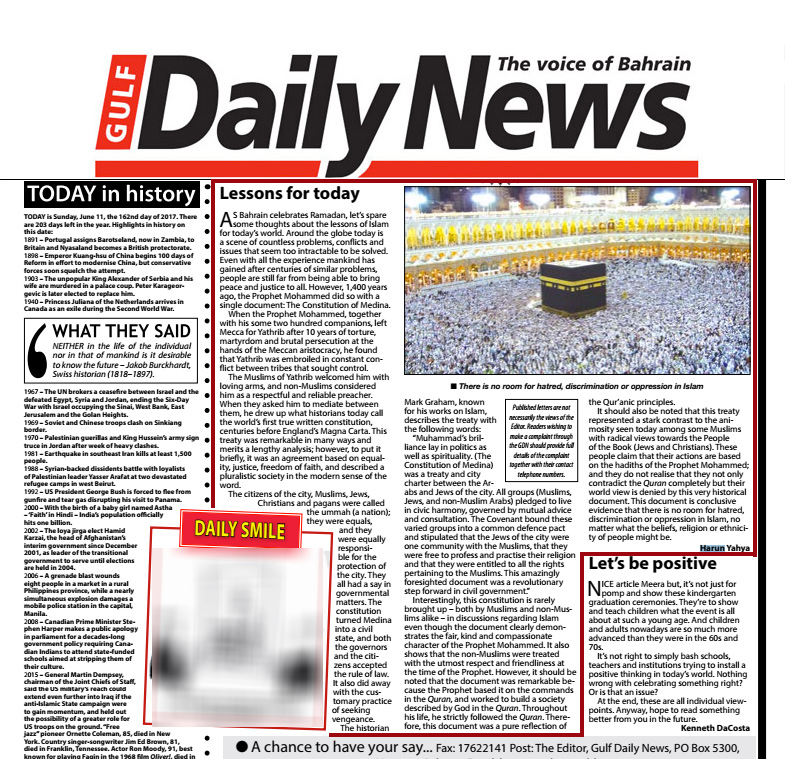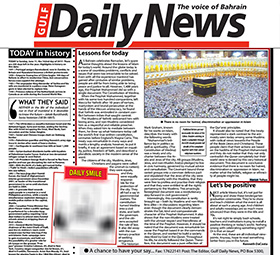
As Bahrain celebrates Ramadan, let’s spare some thoughts about the lessons of Islam for today’s world. Around the globe today is a scene of countless problems, conflicts and issues that seem too intractable to be solved. Even with all the experience mankind has gained after centuries of similar problems, people are still far from being able to bring peace and justice to all. However, 1,400 years ago, the Prophet Mohammed did so with a single document: The Constitution of Medina.
When the Prophet Mohammed, together with his some two hundred companions, left Mecca for Yathrib after 10 years of torture, martyrdom and brutal persecution at the hands of the Meccan aristocracy, he found that Yathrib was embroiled in constant conflict between tribes that sought control.
The Muslims of Yathrib welcomed him with loving arms, and non-Muslims considered him as a respectful and reliable preacher. When they asked him to mediate between them, he drew up what historians today call the world’s first true written constitution, centuries before England’s Magna Carta. This treaty was remarkable in many ways and merits a lengthy analysis; however, to put it briefly, it was an agreement based on equality, justice, freedom of faith, and described a pluralistic society in the modern sense of the word.
The citizens of the city, Muslims, Jews, Christians and pagans were called the ummah (a nation); they were equals, and they were equally responsible for the protection of the city. They all had a say in governmental matters. The constitution turned Medina into a civil state, and both the governors and the citizens accepted the rule of law. It also did away with the customary practice of seeking vengeance.
The historian Mark Graham, known for his works on Islam, describes the treaty with the following words:
“Muhammad’s brilliance lay in politics as well as spirituality. (The Constitution of Medina) was a treaty and city charter between the Arabs and Jews of the city. All groups (Muslims, Jews, and non-Muslim Arabs) pledged to live in civic harmony, governed by mutual advice and consultation. The Covenant bound these varied groups into a common defence pact and stipulated that the Jews of the city were one community with the Muslims, that they were free to profess and practise their religion and that they were entitled to all the rights pertaining to the Muslims. This amazingly foresighted document was a revolutionary step forward in civil government.”
Interestingly, this constitution is rarely brought up – both by Muslims and non-Muslims alike – in discussions regarding Islam even though the document clearly demonstrates the fair, kind and compassionate character of the Prophet Mohammed. It also shows that the non-Muslims were treated with the utmost respect and friendliness at the time of the Prophet. However, it should be noted that the document was remarkable because the Prophet based it on the commands in the Quran, and worked to build a society described by God in the Quran. Throughout his life, he strictly followed the Quran. Therefore, this document was a pure reflection of the Qur’anic principles.
It should also be noted that this treaty represented a stark contrast to the animosity seen today among some Muslims with radical views towards the People of the Book (Jews and Christians). These people claim that their actions are based on the hadiths of the Prophet Mohammed; and they do not realise that they not only contradict the Quran completely but their world view is denied by this very historical document. This document is conclusive evidence that there is no room for hatred, discrimination or oppression in Islam, no matter what the beliefs, religion or ethnicity of people might be.
Adnan Oktar's piece in Gulf Daily News:


